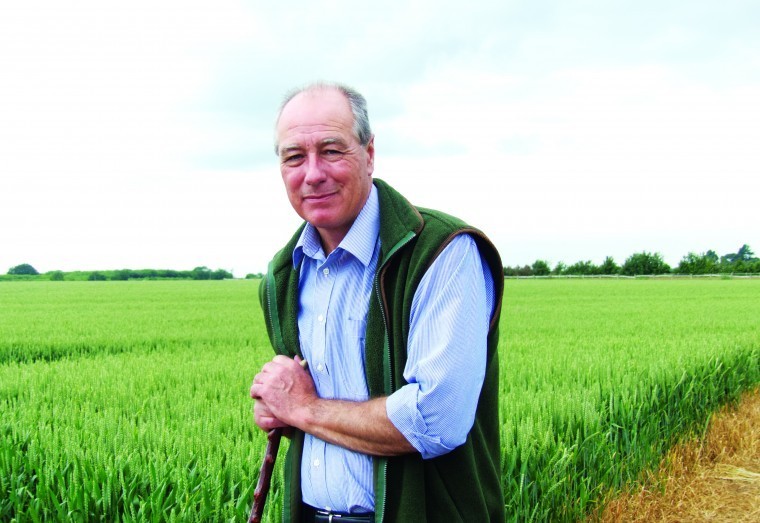The only memorable aspect was the dry weather continuing making it an easy harvest with little to dry. Even the late spring beans could be combined dry – all it took was patience.
As to yields, winter beans were 4.2 tonnes a hectare over the weighbridge and spring 4.1t/ha both clean enough for human consumption. Spring barley ranged from 5t/ha to 7.4t/ha and all malting quality so the sorry crops were not as sorry as in some years. The big disappointment remains the oilseed rape and that has been financially damaging this year.
So as we look forward, the flip side of the dry weather is the very dry ground conditions. With rainfall of less than 10 millimetres between 1 August and 16 September Kent has resembled a desert. Trees have dead leaves and it is not the normal senescence of autumn but the drought and high temperatures killing them. Of the oilseed rape that has been drilled, most has not moved, only germinating with the 12mm of rain on 16 and 17 September.
Those crops are now emerging evenly and with record September temperatures do still have a fair chance of making crops before autumn proper sets in. Where we retained some moisture and saw patchy emergence the bare patches are not filling in. Whether down to slugs eating the seedlings or dying before emergence, the outcome is the same – crops that need part re drilling. Never a very appealing operation.
The next dilemma is when we drill wheat. In practice most of our farms have some fields with a level of resistant blackgrass. As I have said before both oilseed rape and winter bean break crops have disappointing levels of blackgrass that survived the herbicides and seeded. Very little of that seed has germinated with the lack of moisture and high dormancy levels. The correct approach is to wait until mid October to drill those fields allowing more time for blackgrass seed to germinate and be sprayed off and taking advantage of the better residual herbicide performance that comes with later applications. Practically we cannot wait for the whole farm until mid October so I am reconciled to drilling the clean fields on each farm and leaving those fields where we have a known blackgrass problem and returning later. Sounds fine but splitting farms up into early and late drilling deliberately with a 40 mile end to end distance to travel is volunteering for a lot of extra work that will continue right through the year.
As we continue with the phoney war of words over Brexit we have seen the various non governmental organisations putting forward their visions for a new British agricultural policy which largely focuses on no agriculture. Considering that the National Trust, RSPB and Campaign To Protect Rural England (CPRE)are leading that charge there is no surprise in the focus of their touted policies. The National Trust – as one of the largest basic payment scheme claimants with a focus on environmental schemes and farm business tenancies – focused on the non productive aspects of land management. It is no surprise to see them putting self interest first and calling for all future support to be targeted at environmental measures no doubt so they can continue to be the biggest claimant. The CPRE seemed to aim at less intensive agriculture on the basis it would require less building of unsightly farm buildings in their treasured countryside with a return to more traditional systems of production. They did not quite get round to asking for peasant agriculture to be supported but that was the direction of travel. The RSPB with its state of nature report just wants more birds with less farming and a return to peasant agriculture would suit them very well.
Against that backdrop of misinformation the NFU have taken a measured approach to informing and consulting farmers. That has taken time but as we have heard, with nothing new from the anti farming lobby, little has been lost. Clearly the government is taking its time before even triggering the process by signing article 50. Nor do I blame them, for their problems are multiplied by the effect of Brexit on the whole country and economy. If you do not know where you want to go, let alone how to get there, moving slowly is probably the best course of action and in the meantime something may come up to change things or they may become clearer.
I still believe it is very difficult to set out the requirements we need from a British agricultural policy until we know what basic relationship our government wants with Europe. It hinges on whether the ambition is a European Economic Area relationship with single market and some fudge on free movement of labour or World Trade Organisation terms with no single market access and no freedom of movement of labour. The scenarios are so different that from a lobbying perspective it is almost two distinct and different policy asks of government. One thing I am sure of is that we still need productive agriculture to thrive in this country. You cannot eat the environment and if you only concentrate on that without ensuring a profitable farming industry you will not have the farmers you need to deliver the environment nor the food we need to eat.
Pictures: I had the pleasure in showing a visitor from India around our farm in September. In what proved to be a very busy day for business too, our visitors enjoyed the excursion! I am pictured here with Someswara Rao Alacati (far right) who runs a farm in India along with his son Chandra who lives in London.




